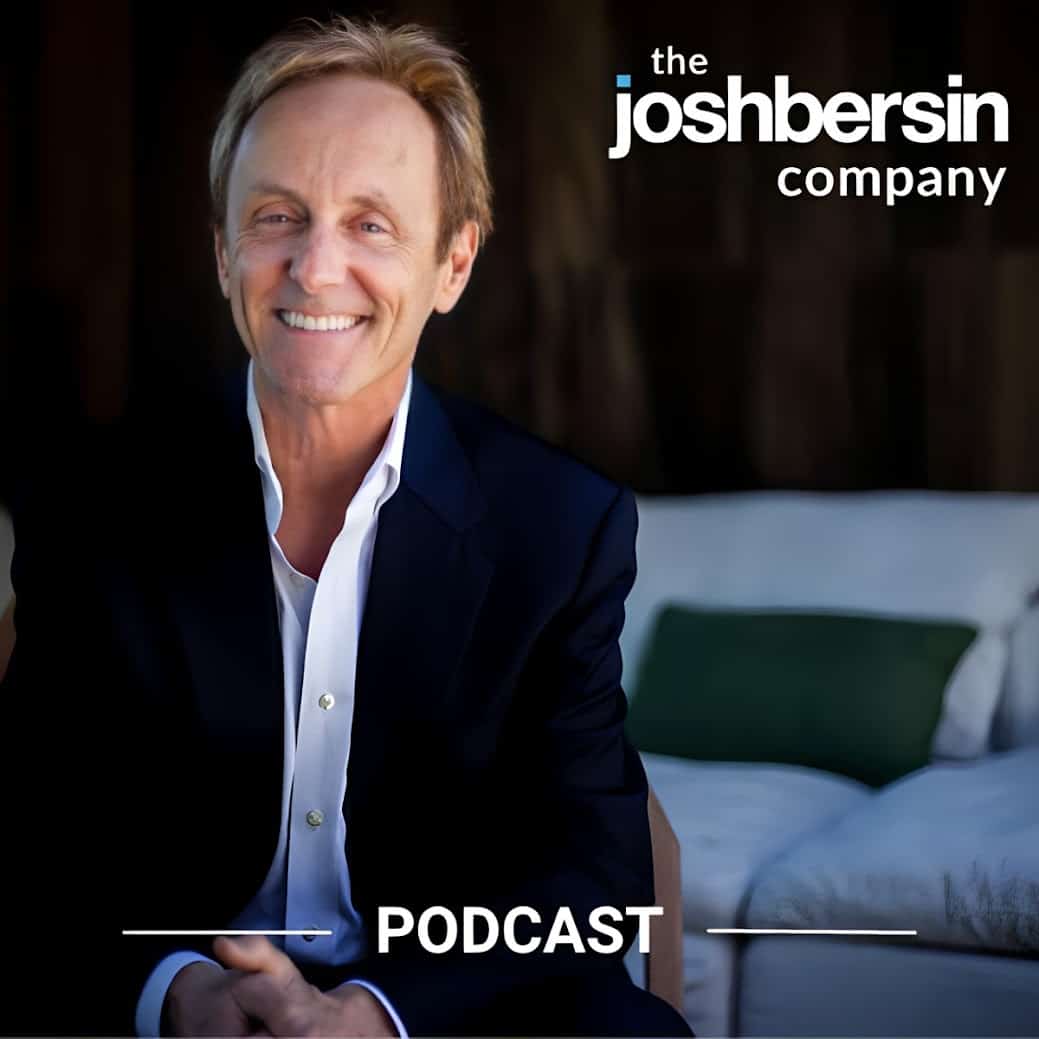Episode Transcript
Speaker 0 00:00:01 Hi, this is Josh person. Welcome to Research-Based Perspectives on the ever-changing World of work, leadership, learning, and HR with a heavy dose of insights on the exciting world of HR technology. Hello everyone. This has been a pretty tumultuous week and it's really been an opportunity to think about a lot of things. So what I'd like to do is summarize what I think is going on in one phrase, and that is the importance of trust in institutions. The center of what happened, of course, was the killing of George Floyd, which looked pretty much like a racist act and led us to believe that certainly the policeman who did it wasn't somebody to be trusted, but perhaps the whole institution of police is at fault. And so we've had hundreds of demonstrations in every city in the country, every state, highly diverse, in fact, most countries of the world, which leads you to believe that maybe it is time for this country to take racial justice seriously.
Speaker 0 00:01:09 But at the same time that was going on, the federal government decided to attack American citizens in Lafayette Park tear gas and pepper spray American citizens who are protesting in the interest of a photo shoot. And I guess the two questions that come to my mind in addition to the issues of racism, which are clearly an issue, are trust. Can we trust the police who is supposed to be protecting and serving us? Can we trust the federal government? And this leads to the bigger issue of can we trust the institutions that you work in, the institutions that you're responsible for? Now, the word trust is a really important word. It turns out, if you look at the latest research by the Edelman PR firm, and this also comes from Pew Research in the United States, only about 14% of Americans believe and trust that the federal government will do the right thing on their behalf.
Speaker 0 00:02:11 In other words, 86% question that. And based on what just happened this week, I think a lot of us are questioning the institutions of our cities and perhaps the institutions of the military. I don't know if that's warranted or not. And rather than get into the issues of racism, which are a big topic, also by the way, we have to figure out how in our companies to create that sense of trust. Because in today's society, certainly over the last decade, businesses and private enterprises are the most trusted institutions in people's lives by far, much more trusted than the media and much more trusted by the political system. And that means that you as HR leaders, as business leaders, as managers, as supervisors, are responsible for not just your projects and your people and your business goals and your revenue and your profit, but really for the institutional health of the trust in your company.
Speaker 0 00:03:08 And what we can see from what's happened this week, at least what I observe, is that a small number of violent acts can remove that trust. When Volkswagen was caught cheating on the emissions equipment, I would say it pretty much destroyed the company for at least a decade, maybe longer. Wells Fargo's been through this, Boeing's been through this, other companies have been through this, and you all have the opportunity to create a sense of trust and also to destroy it. Now, there are three elements to trust. The first is competence. Will the institution do the right thing? In the case of George Floyd, absolutely not. We know that wasn't the right thing, and every time the police does something that's wrong, we don't trust them. And that's true of your company too. If you sell a product that fails or you treat a customer poorly or or there's on a financial transaction, obviously that's a, a lack of trust.
Speaker 0 00:04:03 The second is ethics, honesty, fairness, or what we now think of as justice. Justice is a deeper problem than fairness. In the case of race and diversity and inclusion, we've all spent a lot of time and a lot of money on DNI programs. In fact, I sometimes question whether a lot of these programs work in the United States. For example, there are only four black CEOs among the 500 Fortune 500 companies. That's too low. Out here in California, the tech firms have struggled to hire black and minorities into technology, very, very difficult. They claim there's a lack of supply, which there is. We just had a session last week with recruiting leaders talking about how difficult it's to recruit diverse candidates because there's so much bias against name and college and education and pedigree and looks. We have to create ethical and fair systems to create this sense of trust.
Speaker 0 00:05:01 Now, I don't necessarily know if DNI, for example, creates fairness. We need to look at pay equity, and companies are now reaching the point where they're analyzing pay equity on a regular basis, but we have to go beyond that. When I joined IBM in 1981, I worked for a black manager. We had affirmative action back then, and there were a lot of minorities in senior position at IBM that's been taken away. But in some sense, ethics and fairness might mean bending over backwards to take care of injustices that exist for no fault of our own. So that's number two. The third part of trust is listening. Basically opening your ears, opening your eyes, and taking advantage of the information from your stakeholders, your employees, your citizens, your customers. Now, most of you know this is an important part of our business, important part of our jobs.
Speaker 0 00:05:58 The whole employee experience initiative in HR has been about employee listening, but in the bigger broader sense, listening also means allowing employees to speak up when they feel there's an injustice in their lives. This week, for example, I'm sure many of you had situations in your companies where employees wanted to speak up about Black Lives Matter, and most of you probably didn't want to have those conversations because they're sensitive and difficult, and there's not always a right or wrong answer. And many of you have management teams that probably aren't as diverse as you would like them to be. But nevertheless, part of trust is being willing to listen. I noticed that Ryan, Russ Lansky, the new CEO of LinkedIn who just took his job last week, had an open town hall, and it's posted on LinkedIn about all of the things people wanted to get off their minds.
Speaker 0 00:06:48 So did SA Adela at Microsoft's, and I'm sure a lot of the rest of you had. And the more you listen, the more sensitive you and your organization will become to the real needs of the people around you, and the more trusting you will be. By the way, listening doesn't mean you have to do everything. People ask for a lot of the things people want to talk about, they just want to talk about. They just want to know that you hear them. And maybe it's a small adjustment that'll be made in the company to react. Now, the final thing I wanna say about trust is the importance of embracing and institutionalizing trust in all levels of the company. I remember several years ago meeting with ikea, and it was at least two or three years ago, and we were talking about income inequality at the time, and I gave a presentation on corporate citizenship, and I wasn't sure how well it was gonna go off, and they came back to me and they loved it.
Speaker 0 00:07:42 And they said that at ikea, taking care of the environment and creating well designed, beautifully designed space is the most important thing in their business, more important than a profit. And they said that all of the decisions in Ikea that are made, even at a local level, are made by committees across all different businesses around the world, around the country, so that other people can weigh in. They believe in social and a social contract within the company, and they believe in the sense of design and environmental good, and that has made them a successful company for many, many years. A result of that, you all know the story of Patagonia, how Patagonia in some ways is a mission disguised as a company. Everything in Patagonia is about making the environment better. And in fact, it's very famous that Patagonia allows and encourages employees to speak out on political issues, whatever side they may take, so that Patagonia can effectively derive its mission.
Speaker 0 00:08:47 All of your companies have the potential to do this in big or small ways. The role, the line of citizenship goes a long way. It starts with taking care of customers and shareholders, then taking care of employees and suppliers, then taking care of communities and families, then taking care of environment and the society as a whole. And you can go up that chain as long as you want as an organization to create a deeper sense of trust. Finally, let me give you one more thought to think about. One of the worst thing that's happened this week is the sense of trauma that people now feel. We have to be sensitive to that situation. This sense of national trauma that the United States is suffering from, from 200 years of racial inequality is bubbled to the surface. People are sensitive, people are upset, there's a sense of harm, there's a sense of fear, there's a sense of anger, and there's a sense of sadness amongst many of us.
Speaker 0 00:09:46 I believe we're in a very hypersensitive time, and we are coming through four months of pandemic. We've been locked in our homes, we've been taken away from our food and our families and many of our best friends and our abilities to travel and go on vacation. And many of you and I haven't had a vacation all year because we've been dealing with all this and this always on digital life. So it's a good time right now as you think about trust, to just practice a little patience and understanding and forgiveness. I do believe that everybody in the world, every human being pretty much wants the same thing. We wanna be successful in our lives. We want to contribute to others. We wanna have reasonable standard of living, and we wanna take care of our friends and our family and those around us. The situation we're in now as violent and difficult as it seems, is simply a sense of trauma that we're all experiencing and we need to get through.
Speaker 0 00:10:46 We have the trauma of the pandemic, we have the trauma of the George Floyd killing, and we have the trauma of trying to get the political system to right the ship as fast as possible. I simply think that for us as HR people, we need just remember this, that these three elements of trust, the issue of competence, the issue of ethics, the issue of listening are now central to everything that we do. Employees wanna go back to work, but they want to trust that their employer and that the workplace will be safe. Managers want to work well with their employees, but they have to trust them when they're at home and they can't see them all day. This is happening at all levels of organizations, and maybe the lesson and the benefit of everything that's happened this week is it's taught us one more time the importance of reinforcing this sense of trust in our institutions, which will of course make your company and your business thrive in the future. Thank you.
Speaker 0 00:12:02 If you like what you heard, please join the Josh Burson Academy, the world's professional development academy for hr for less than a cost of a nice dinner in a town near you. You can have an entire year's access to hundreds of courses, articles, research studies, case studies, and an entire community of more than 10,000 HR professionals all collaborating with each other to help you learn and solve the problems in your particular company. We call the Burson Academy, the world's home for hr, and you'll find it to be one of the most important parts of your career and your company's HR strategy for the years ahead. Thank you.


